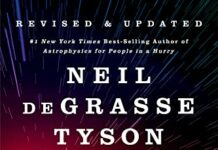
Ebook Info
- Published: 2012
- Number of pages: 387 pages
- Format: PDF
- File Size: 3.43 MB
- Authors: Neil deGrasse Tyson
Description
“A compelling appeal, at just the right time, for continuing to look up.”—Air & SpaceAmerica’s space program is at a turning point. After decades of global primacy, NASA has ended the space-shuttle program, cutting off its access to space. No astronauts will be launched in an American craft, from American soil, until the 2020s, and NASA may soon find itself eclipsed by other countries’ space programs.With his signature wit and thought-provoking insights, Neil deGrasse Tyson—one of our foremost thinkers on all things space—illuminates the past, present, and future of space exploration and brilliantly reminds us why NASA matters now as much as ever. As Tyson reveals, exploring the space frontier can profoundly enrich many aspects of our daily lives, from education systems and the economy to national security and morale. For America to maintain its status as a global leader and a technological innovator, he explains, we must regain our enthusiasm and curiosity about what lies beyond our world.Provocative, humorous, and wonderfully readable, Space Chronicles represents the best of Tyson’s recent commentary, including a must-read prologue on NASA and partisan politics. Reflecting on topics that range from scientific literacy to space-travel missteps, Tyson gives us an urgent, clear-eyed, and ultimately inspiring vision for the future.
User’s Reviews
Reviews from Amazon users which were colected at the time this book was published on the website:
⭐On October 4, 1957, the first artificial satellite, Sputnik 1, was launched into orbit. This technological first marked the beginning of a new era of competition between the former Soviet Union and the United States. While on the surface the Space Race might have appeared to be spurred on by man’s desire for knowledge and exploration, in truth, the only thing that made man’s footprints on the Moon possible was the looming Cold War and aspiration to assert technological dominance over each other. Adjusted for inflation, the Apollo program today would cost over 200 billion dollars, twenty times the yearly budget of NASA. It is unlikely any of us alive today will ever see man step foot on the Moon or another planetary surface, or see the equivalent of what millions of people witnessed on July 20, 1969 when Apollo 11 landed on the Moon. The overwhelming costs, technological hurdles, and political backdrop are what make the Space Race such a fascinating subject, and it would be hard to find someone who is so passionate about it or conveys these ideas better than astrophysicist Neil deGrasse Tyson.Like his last novel
⭐, Space Chronicles is a compilation of previously-published articles and talks over the last fifteen years, with a central theme of the Space Race and exploration (although some of the chapters don’t really fit this theme entirely). It is mostly centered on the United States’ involvement with a look at the development of NASA. It contains an original prologue by Dr. Tyson with a discussion on Space Politics, with a focus on the last three presidential administrations. A selection of Dr. Tyson’s tweets (which are usually interesting facts about the Universe) are scattered in relevant sections throughout the book, and add short distractions to the current chapter. The rest of the book is divided into three sections:Part 1 – Why – Articles detailing with the reasons humans desire to explore spacePart 2 – How – Articles concerned with how we have overcome the barriers to space entry.Part 3 – Why Not – These chapters are mostly ideological articles and speeches about why we should explore space.The last third of the book contain Appendices related to NASA and space travel. I think they’re a nice addition to Space Chronicles, although I’m pretty sure they were added as filler, since without them, the actual content of the book is only 220 pages. All of them are easily found online but they make a nice reference while reading and I frequently found myself going back to them. They consist of:National Aeronautics and Space Act of 1958 (the law that created NASA)NASA’s budget from 1959-20102010 Space Budgets for the United States and GloballySpace Budgets: US and Non US: 2010Anyone who has enjoyed Dr. Tyson’s previous books will enjoy Space Chronicles. Since it doesn’t deal with as much cosmology, it is a bit easier read than his last book,
⭐. I also found it more persuasive. Space exploration is a subject Dr. Tyson excels at. For anyone who has ever heard him give a speech on the subject, he offers up very convincing reasons for the necessity of a space program, many which will resonate long after finishing the book. A great example of this is the final chapter in the book, which is a speech given at the University of Buffalo that I originally saw two years ago, and still has a powerful impact on me today. Unlike Death by Black Hole, which seemed to be a bit thrown together and thematically forced, the articles that make up Space Chronicles flow much easier into each other and under their relevant chapters, although you will notice some repetition throughout them. The speeches that make up some of the chapters are also well-adapted, although I strongly encourage anyone who enjoys them to go back and watch the original videos, or actually, to just skip those chapters and watch the videos instead (especially the last chapter). The main reason Dr. Tyson is so successful as a media figure is due to his ability to convey subject matter to his audience, and he does this best in person, where his passion and oration can really stand out.Almost all of the material from this book is already available publicly online. The only original material I noticed was the prologue and a poem (Ode to Challenger, 1986). Although it’s been published before, I think the editor has done an excellent job in culling through Tyson’s large body of work to pick the best material, and arranged it in a way that makes for an intriguing (albeit very short) read. Some of the chapters are as short as one paragraph, others are a dozen pages or so. Tyson’s most ardent fans might find the material a bit too familiar, but as a whole, Space Chronicles presents itself as a nicely-wrapped look at the last fifty years of space travel, and what’s in store for the future. All of the material works well in the book, but all of the chapters adapted from speeches are much better when viewed in their original video presentation. Other than the length of the book, the only real criticism I could give it is that it doesn’t source the original material. A few of the chapters do this and actually state at the top that they are from videos, but most of them don’t. I can’t figure out any rhyme or reason to including this information on some but not others, which would seem simple enough to do (I was able to find almost all of it in about an hour). If you are interested in reading some of the articles or videos from the book, I will provide links to all of those that I’ve been able to find that are in the public domain, as well as book previews from the publisher and Google Books in the review comments below.
⭐It’s easy to get caught up in Neil DeGrasse Tyson’s writing. He’s energetic and enthusiastic. But Space Chronicles reads like a promotional presentation on behalf of NASA, rather than a call to reach to the cosmos. To listen to Dr. Tyson is to believe that the only salvation for American space presence is the lumbering juggernaut of NASA. He calls for us to remember all of the things the government’s space program has produced for us, from Velcro to cloths used for military and firefighter uniforms. But along the way he totally ignores the fact that much of the research that produced these items was the sweat of private companies who accepted the government’s call for new and improved products and materials to enhance our forays into space. He glosses over the colossal blunders, expensive ones, that have been made under the NASA masthead, which contributed to the slowdown of both money and enthusiasm for America’s space program.He calls the space program nonpartisan, but then admits that NASA has been politically marginalized, dividing up into competing camps that manifest all of the same competitive tanglefoot that has neutered congress. Just as with the government, when the differing sides refuse to work together, little, if anything, gets done. Rather than pressing for more privatized involvement in space research, he maintains a focus on NASA, repeatedly bringing economies of scale into the conversation to blur the realities of our country’s economic position. He points to other countries which are not in the economic straits we’re currently experiencing and tries to throw down the gauntlet that we should be able to do better. Yet he also admits that the only place in space exploration that we were ever number one was in landing on the moon –some 40 or so years ago. That was then, in a different economic and national situation, and this is now. That in ratio and proportion so little could be spent to produce a new wealth of advances totally ignores that it’s hard to carve extra money from our mind boggling budgetary deficit. One cannot spend what one doesn’t have, and right now the government is spending negative dollars.I can’t help but think about flagging educational monies and our embarrassing position in terms of schooled minds available to perform the research he speaks of. I have to think that perhaps spending more on education –and putting hooks on the money to have educational institutions focus on the sciences rather than sports might be a better way to spend the dollars we might budget. In America we spend $41 billion dollars a year on pets, so strikes me that the private sector has a lot more money to spend on space than the government currently does. For all of the returns on investment that Dr. Tyson speaks of, I have to wonder why, if it is so lucrative, aren’t more companies investing in space? When this question is asked of the relative few companies that are investing in space, they speak of the tremendous governmental obstacles involved. Problems which, as I hear the interviews, point at NASA and Homeland Security as the biggest sticks in the mud. So I have to question whether Dr. Tyson is promoting space, or is he promoting NASA?But Tyson’s writing is engaging, and he brings to light a tremendous amount of knowledge in his entertaining writing. He has a ready wit and shows it often as the pages go by. Considering the dryness of much of the information, he makes it palatable with style and grace. But when I lift my head out of the atmosphere he creates, I can see the many things that he readily distracts us from. I metaphor his writing as “Do you want to be rich? It’s easy! Get a lot of money.” There is just too much missing as he seemingly points the way to future prosperity and growth. I tend to think that if he put his apparently boundless energies into advocating for space, rather than just NASA, that we might tend to see more of the fruits he says are out there for the taking.As he opened the book, he spoke of how after our astronauts strolled on the moon, that people all over the world would smilingly cheer “We did it!” They took part of the credit as members of the human race. He based this on the fact that the achievement was a planetary one rather than national. He lauded this warmly, explaining that space should be a human endeavor and not a national one. Yet his book continually speaks to how well other nations are doing in space advancement, and keeps saying that we are behind. If it’s truly the end product that’s important, why is is so imperative that Americans lead, rather than playing a supportive role? If it was alright for peoples of other nations to have only moral supporting roles when we reached the moon, why isn’t it alright for us to do so now; and why is it so important that it be NASA making the accomplishments?I think this book would be a much more valuable writing if it encouraged mainstream American involvement in space and the reach for the stars. It would have been, in my opinion, better to point to the riches and benefits awaiting investors, encouraging them to jump in. Then add pleas for governmental subsidy and tax benefits for the space efforts of private sector investors. Then too, Dr. Tyson speaks to the fact that we haven’t really provided a lot of the minds that went into our accomplishments to date, but imported them from other nations instead. He says that now those minds are going elsewhere or staying home where greater opportunities for careers in space research are more prolific. So it only seems to make sense to fan the flames of generating American minds by encouraging for more places for American minds to build on their dreams of space –while not being confined to Hollywood special effects to do it.I enjoyed this book, and I would recommend it to others with an interest in the heavens. But I would do so with the caveat that it appears to be more a promotion of NASA than a promotion of space study advancement.
⭐I rated this 4 stars purely because I love the passion and poetic enthusiasm that Neil deGrasse Tyson (henceforth NDT) brings to all manners of different space and cosmic related subjects, but I might have otherwise rated it a 3, because it’s a collection of previously published articles rather than a ‘real’ book, and so does tend to get repetitive in the topics that it addresses.If you’re interested in the history and trivia of things like the space race of the late 60s and early 70s (which I happen to be), and how that changed and became ingrained in American culture, it’s definitely going to be a hit for you. There are other more educational aspects that I also loved. These included the treatment of such things as how rocket propulsion works, descriptions of future propulsion systems (some already tested), explanations of the LaGrangian points, and how the space shuttles re-entered the Earth’s atmosphere. In addition, all of these things are consistently peppered with lots of little interesting facts and trivia that you could use to impress your family and friends at parties, or that might come in handy for pub quizzes.Having said that, I don’t think the book is for everyone. If you’re not interested in things such as the space race, and possibly if you’re not generally interested in space related subjects, I doubt that this book would win you over, because of the article type format. In retrospect, due to the repetition, I may have even read each section of the book (it’s split into 3 sections) over separate spread out reading sessions. I think if I was going to recommend this book to someone else, that’s the way I would recommend reading it.I think it also might help to be an American (I’m Scottish) when reading this book, as it’s quite clear that the articles are more addressed to that audience (though certainly a lot of the principles discussed apply on scales beyond any one nation). This is because NDT consistently laments about what America once was, in terms of science and engineering, after the space race inspired it, and how much other nations are now catching up. He talks about how a revival of the golden era space age might inspire the new generations and put America back on top.I do think that it’s quite fair that NDT would be described as the current generation’s Carl Sagan. He deserves to be more well known than he is currently (he also has a comedic dimension that Carl Sagan never had; you can witness his audience in complete hysterics in some of the talks he’s given that are available on YouTube). He is definitely the kind of person who is going to inspire and encourage the next generation to go into science and engineering rather than producing lawyers or people going into ‘media studies’. However, as he mentions in this book, he needs good ammunition to inspire that generation.That ammunition will come from grand visions and investment in organisations such as NASA. As he says:”when I stand in front of eight-graders I don’t want to have to say to them, ‘Become an aerospace engineer so that you can build an airplane that’s 20 percent more fuel efficient than the ones your parent’s flew on.’ That won’t get them excited. What I need to say is, ‘Become an aerospace engineer so that you can design the airfoil that will be the first piloted craft in the rarefied atmosphere of Mars.’ ‘Become a biologist because we need people to look for life, not only on Mars but on Europa and elsewhere in the galaxy.’ … You put that vision out there, and my job becomes easy, because I just have to point them to it and the ambition rises up within them.”If only there was a Neil deGrasse Tyson in every school and university…
⭐Good book to ponder. Informative but light.
⭐NdGT has an interesting perspective on ‘space’. It’s quite a good read but I might have preferred a bit more technical details – though the e-book is written for anyone who is not particularly scientific
⭐This was a present but have been told it is really good.
⭐Excellent read.. loved every page.
Keywords
Free Download Space Chronicles: Facing the Ultimate Frontier in PDF format
Space Chronicles: Facing the Ultimate Frontier PDF Free Download
Download Space Chronicles: Facing the Ultimate Frontier 2012 PDF Free
Space Chronicles: Facing the Ultimate Frontier 2012 PDF Free Download
Download Space Chronicles: Facing the Ultimate Frontier PDF
Free Download Ebook Space Chronicles: Facing the Ultimate Frontier



